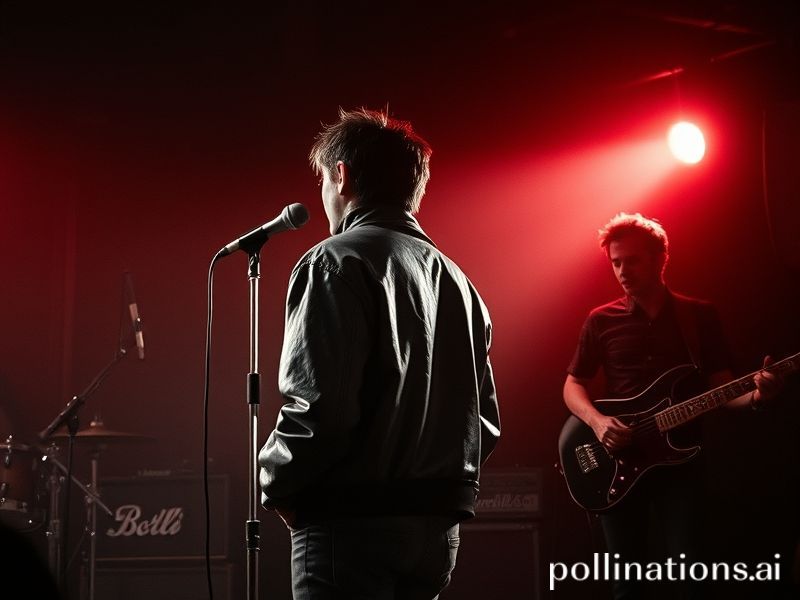The Strokes: How Five Manhattan Rich Kids Outsourced Cool to the Rest of the Planet
The Strokes: How Five Rich Kids from Manhattan Accidentally Became the Soundtrack to a Planet That Forgot What It Was Rebelling Against
By the time Is This It dropped in July 2001, the world was already busy stockpiling duct tape and rehearsing new lines about freedom fries. While NATO ministers huddled in Brussels drafting press releases nobody believed, five over-privileged New Yorkers in Converse and leather jackets were busy convincing teenagers from Buenos Aires to Budapest that apathy, when properly distorted, could be a political act. The irony, of course, is that the band never asked for geopolitical significance; they just wanted cheaper beer and a faster way out of prep school. History rarely checks the syllabus.
From Shibuya basements to São Paulo rooftops, the Strokes’ debut became the first truly global lo-fi manifesto: recorded on a shoestring budget that wouldn’t cover a single drone strike, exported on scratched minidiscs alongside counterfeit Marlboros, and sold back to America as proof that cool still originated below 14th Street. International critics, ever eager to map cultural revolutions onto subway stops, labeled it “garage rock for the Davos set,” which missed the point entirely: the Strokes sounded like the bored children of oligarchs precisely because they were. Their amplifiers hummed with the static of old money discovering distortion pedals. Somewhere in the Hague, a tribunal should have taken notes.
The band’s timing was cosmically impeccable. Broadband was metastasizing, iPods were replacing diplomatic pouches, and every customs agent from Dubai to Düsseldorf suddenly had to memorize the tracklist of Room on Fire. The Strokes didn’t conquer the world so much as slip through its back door while the bouncers were busy strip-searching world leaders for WMDs. By 2003, Julian Casablancas’ laconic slur was being imitated in accents the State Department couldn’t classify: Korean kids sneering “last nite” in Gangnam karaoke booths, French philosophy students citing “Soma” in footnotes to Baudrillard. Soft power had a new uniform, and it looked suspiciously like a rumpled blazer that cost more than your monthly rent.
Naturally, the backlash was multinational. British tabloids accused them of cultural colonialism—rich irony coming from a country that once administered half the planet via gin and gunboats. German papers ran earnest op-eds asking whether “New York City Cops” constituted anti-police brutality or merely aesthetic tourism. Meanwhile, actual New York City cops were busy inventing new categories of brutality, but that didn’t scan as well on the Hype Machine. In Russia, state television briefly flirted with banning the band for “promoting idleness,” until someone realized idleness was already national policy.
What the Strokes really exported was a template for fashionable disaffection that translated across currencies. Their chord progressions were simple enough to be learned by any kid with a pawn-shop guitar and a grudge against the International Monetary Fund. Their lyrics were vague enough to soundtrack both anti-globalization riots and overpriced after-parties in the same evening. If you squinted (or were sufficiently jet-lagged), “Reptilia” could be about third-world debt or a bad breakup in Prague—interpretive flexibility being the hallmark of any successful franchise.
Fifteen years on, the planet is hotter, the oligarchs are richer, and the Strokes are still touring, now sponsored by brands that also outfit yacht militias. Casablancas has graduated from mumbling about last night to mumbling about media monopolies, which is progress of a sort. At festivals from Coachella to Corona Capital, their setlists function like a UN of nostalgia: every chorus a reminder that teenage nihilism ages about as well as cheap coke. Yet the crowds keep swelling, united less by rebellion than by a shared recognition that the future we were promised never showed up—and at least the guitars still feedback on time.
In the end, the Strokes taught the world that cynicism travels lighter than ideology, and that nothing unites disparate nations quite like agreeing the party is probably over. They didn’t change the world; they just provided the elevator music while it declined, tastefully. History will note that when the lights finally go out, someone, somewhere, will still be humming “Someday”—off-key, naturally, but in perfect international synchrony.







